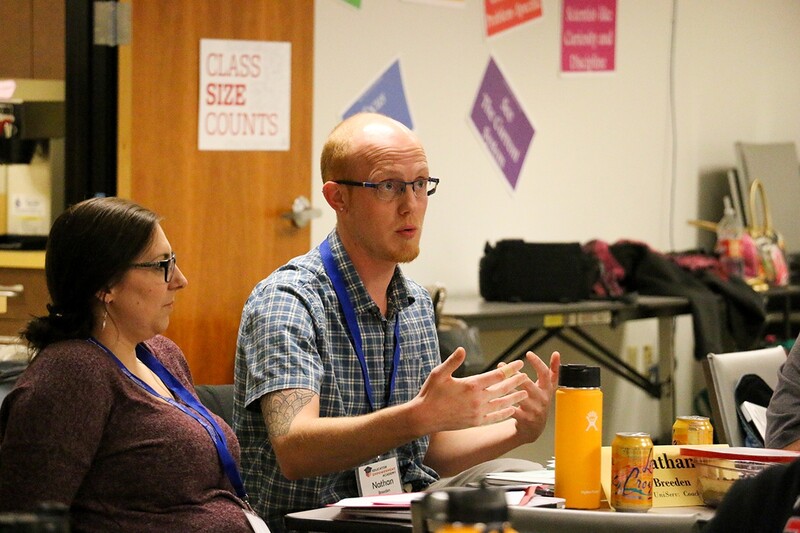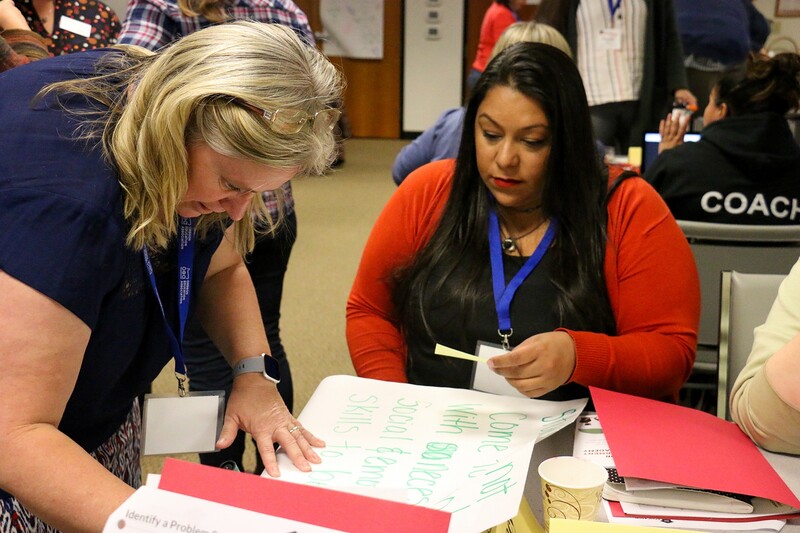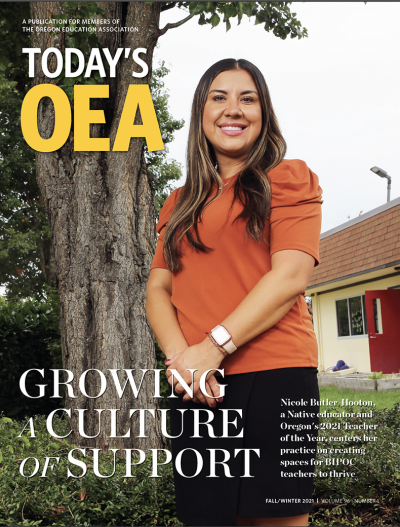Do you have students who have experienced trauma, need mental health support, or need behavior support? Do you have everything you need to keep your students engaged in a culturally responsive and sustaining way? Have you seen student or staff burnout on the rise?
The Oregon Education Association spent the last 18 months listening to member needs regarding the Disrupted Learning crisis in our schools. We heard from thousands of members who want and need more support in solving these issues locally, and from these conversations created a report with ten actions essential to helping solve this complicated issue (Read more here).
At the same time, members were asked to help identify solutions to this crisis that they thought would be meaningful and relevant. Through this feedback, OEA created the Educator Empowerment Academy in response to their thoughtful suggestions. As one Academy participant, Judy Tacchini from Bethel School District, says, “I am completely committed to helping be part of the solution when it comes to disrupted learning in Oregon. I have been fortunate enough to travel around the country and attend many workshops on student trauma and the impact this has on our learning environments. As my practice continues to grow and improve, my biggest desire is to continue learning about trauma informed practices and to make necessary shifts in my teaching to reach every learner in my classroom.” In the Academy, OEA will support Tacchini in doing just that!
What is it?
All around Oregon, union leaders submitted teams of members, just like you, who will be participating in our year-long journey. The Educator Empowerment Academy is designed to build knowledge and skills to support teams as they collectively tackle a problem of practice around disrupted learning. Teams will come together with other educators during Learning Sessions, or convenings, and will be working with a variety of people from across the state who are solving similar problems around disrupted learning. In between convenings, teams will have access to an OEA member-leader who has been trained as an Empowerment Coach to support learning and implementation of each team’s action plan, ultimately leading to teams finding a variety of improvements that work for them. Teams will deepen their understanding of the principles of improvement and learn ways to operationalize equity throughout the Empowerment Process.

Nathan Breeden, Eastern Oregon UniServ's Empowerment Coach and his teammate Holli Leavitt, also from Eastern Oregon.
Photo credit: Meg Krugel
What is the Empowerment Process?
The OEA Educator Empowerment Academy will engage participants in an OEA-designed Empowerment Process. The Empowerment Process prioritizes three core sets of guiding principles (human-centered design, community-based organizing, and improvement science principles) that will prepare Academy participants to empower themselves and the most important people in their system to collectively solve tough problems of practice.
Human-Centered Design Principles: To be human-centered means that your process prioritizes the perspectives and experiences of the people you’re designing with and for (not to). Some key principles include:
- Have empathy for humans in your system. Caring about who people are and attempting to walk in their shoes is an important first step in any process that puts humans first.
- Engage people who are most-impacted by the issue to solve the issue. Share power, share authority, and share the table - further, use power and privilege to build tables where they once did not exist.
- Design potential solutions with people in mind - every step of the way, ask humans in your system what they think, what they like, and what could be improved as solutions are designed.
Community-Based Organizing Principles:
Community-based organizing is the process of people coming together to address issues that matter to them. Some key principles include:
- Organizing > Activism: Activism is an individual pursuit when one person takes an action to make a difference. This is a great thing… but organizing is greater because organizing gets other people to take action, to work together, and to build a collective movement that can make a significant and long-term difference.
- Organizing is about relationships. To organize people, you need to know them. You need to know who they are, what they care about, what they are willing to do, and how to get in touch with them. They also need to know you. They need to know you are sincere, competent, and that you care about them.
- Meet people where they are, not where you want them to be. What do they know? What do they care about? What do they hope for and what do they fear? You find this out through a combination of empathy and listening. Listen for the chance to meet people where they are and make a real difference, whether by helping them move or joining in a cause they care about.
- Diverse and inclusive coalitions are stronger, and building that takes work. Community-based organizing is founded on the premise that we are more effective when we work together across our differences to make a difference. That if we want to go fast, we go alone; but if we want to go farther, we go together. Diverse coalitions bring new ideas, perspectives, and lived experiences, which further enriches the possibility of finding solutions that work.

Tracy VanWormer, left, Empowerment Coach for Southern Oregon and South Coast UniServ's teams works with Danielle Duran, an ESP from Brookings-Harbor EA at the October Educator Empowerment Academy kick-off.
Photo credit: Meg Krugel
Improvement Science Principles:
Improvement science recognizes that there is a wealth of knowledge individual practitioners hold that could be shared with others in a way that helps us learn together, more deeply and more quickly. If we start with a practitioner-driven problem or need and take into consideration all the local context that might require adaptation, those educator-driven solutions will be better for students and the education system. Some key principles include:
- Make the work problem-specific and human-centered. It starts with a single question: “What specifically is the problem we are trying to solve?” It enlivens a co-development orientation: engage key participants early and often.
- See the system that produces the current outcomes. It is hard to improve what you do not fully understand. Explore how local conditions impact outcomes so those systems can be changed.
- Adopt an improvement-cycle approach to trying out possible solutions. Engage in rapid cycles of Plan, Do, Study, Act (PDSA) to learn fast, fail fast, and improve quickly. That failures may occur is not the problem; that we fail to learn from them is.
- Accelerate improvements through networked communities. Embrace the wisdom of crowds. We can accomplish more together than even the best of us can accomplish alone.

